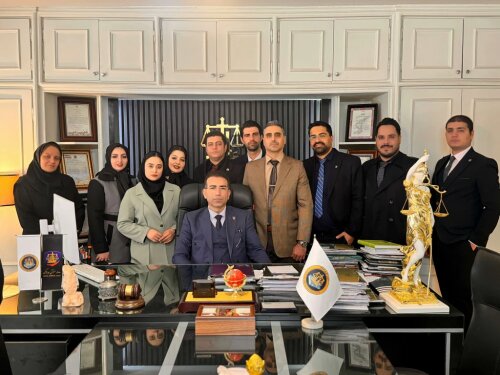Best Real Estate Contracts and Negotiations Lawyers in Iran
Share your needs with us, get contacted by law firms.
Free. Takes 2 min.
Free Guide to Hiring a Real Estate Lawyer
Or refine your search by selecting a city:
List of the best lawyers in Iran
About Real Estate Contracts and Negotiations
Real estate contracts and negotiations in Iran involve legal agreements and discussions related to the buying, selling, or leasing of property. These contracts outline the terms and conditions under which the transaction will take place and are essential for ensuring a smooth and legally binding process.
Law in Iran
In Iran, real estate contracts and negotiations are governed by a combination of civil law, Islamic law, and regulations set by the Ministry of Roads and Urban Development. These laws outline the rights and responsibilities of both parties involved in a real estate transaction and provide a legal framework for resolving disputes.
Why You May Need a Lawyer
You may need a lawyer for real estate contracts and negotiations in Iran if you are buying or selling property, negotiating lease agreements, facing disputes with other parties, or require legal advice on complex contract terms. A lawyer can help protect your interests, ensure compliance with local laws, and provide guidance throughout the process.
Local Laws Overview
Some key aspects of local laws in Iran that are relevant to real estate contracts and negotiations include regulations on property ownership, lease agreements, construction permits, and dispute resolution mechanisms. It is important to be aware of these laws to ensure that your real estate transactions are legally valid and enforceable.
Frequently Asked Questions
1. What is the process for buying property in Iran?
The process for buying property in Iran involves signing a contract, conducting due diligence, obtaining necessary permits, and transferring ownership through a notary public.
2. Are there any restrictions on foreign ownership of property in Iran?
Yes, there are restrictions on foreign ownership of property in Iran, particularly for agricultural land and properties near borders or sensitive areas.
3. How can I resolve a dispute with the other party in a real estate contract?
You can resolve a dispute through negotiation, mediation, arbitration, or through the legal system in Iran, depending on the nature of the conflict.
4. What are the common terms included in a real estate contract in Iran?
Common terms include the property description, purchase price, payment schedule, possession date, and conditions for termination or breach of contract.
5. Is it necessary to have a lawyer for real estate transactions in Iran?
While it is not mandatory to have a lawyer, it is highly recommended to seek legal advice to protect your interests and ensure compliance with local laws.
6. Can I cancel a real estate contract in Iran?
Yes, you can cancel a real estate contract in Iran under specific circumstances, such as mutual agreement or breach of contract by the other party.
7. How long does it take to complete a real estate transaction in Iran?
The timeline for completing a real estate transaction in Iran can vary based on the complexity of the deal, but it typically takes several weeks to months.
8. What are the taxes and fees associated with real estate transactions in Iran?
Taxes and fees may include transaction costs, transfer taxes, notary fees, and registration fees, which can vary depending on the type and value of the property.
9. Can I lease property in Iran as a foreigner?
Yes, foreigners can lease property in Iran, but they may be subject to certain restrictions and regulations imposed by the government.
10. How can I verify the ownership status of a property in Iran?
You can verify the ownership status of a property in Iran by conducting a title search, reviewing official documents, and consulting with legal professionals or real estate experts.
Additional Resources
For additional resources related to real estate contracts and negotiations in Iran, you can consult the Ministry of Roads and Urban Development, Iranian Bar Association, or legal firms specializing in real estate law.
Next Steps
If you require legal assistance in real estate contracts and negotiations in Iran, the first step is to consult with a qualified lawyer who can provide guidance and representation throughout the process. Be prepared to provide relevant documents, discuss your goals and concerns, and follow their advice to ensure a successful transaction.
Lawzana helps you find the best lawyers and law firms in Iran through a curated and pre-screened list of qualified legal professionals. Our platform offers rankings and detailed profiles of attorneys and law firms, allowing you to compare based on practice areas, including Real Estate Contracts and Negotiations, experience, and client feedback.
Each profile includes a description of the firm's areas of practice, client reviews, team members and partners, year of establishment, spoken languages, office locations, contact information, social media presence, and any published articles or resources. Most firms on our platform speak English and are experienced in both local and international legal matters.
Get a quote from top-rated law firms in Iran — quickly, securely, and without unnecessary hassle.
Disclaimer:
The information provided on this page is for general informational purposes only and does not constitute legal advice. While we strive to ensure the accuracy and relevance of the content, legal information may change over time, and interpretations of the law can vary. You should always consult with a qualified legal professional for advice specific to your situation.
We disclaim all liability for actions taken or not taken based on the content of this page. If you believe any information is incorrect or outdated, please contact us, and we will review and update it where appropriate.
Browse real estate contracts and negotiations law firms by city in Iran
Refine your search by selecting a city.

















